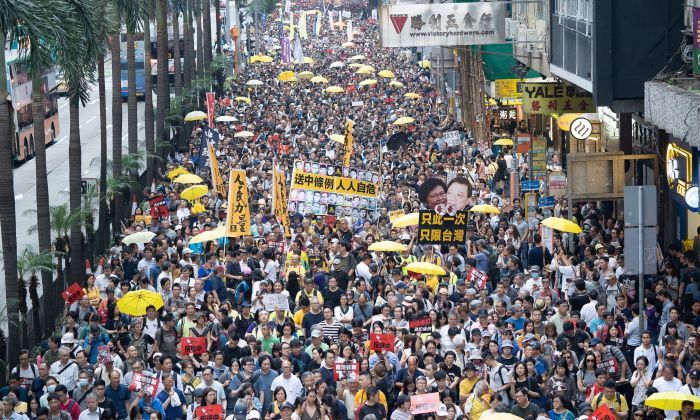Proposed amendments to Hong Kong extradition laws had over 130,000 residents of the former British colony out on the streets in protest, as passing the legislation would give the communist Chinese authorities the authority to extradite suspects to the mainland for criminal proceedings.
According to police at the scene on April 28, there were only 23,000 people in attendance, but reporters from The Epoch Times gave a much higher count, as more people flooded in to join the crowd parading through the city.
Hong Kong, which was returned to Chinese sovereignty in 1997, enjoys a measure of political autonomy under the “one country, two systems” arrangement with Beijing. But these privileges have been steadily eroded as the Chinese Communist Party (CCP) levies pressure on local officials.
First announced in February, the proposed extradition laws would allow Hong Kong’s chief executive to bypass the city’s legislative council in signing off requests to extradite prisoners of any national origin to mainland China.

Carrie Lam, Hong Kong’s Beijing-approved Chief Executive, in 2018. (Image: VOA/Public Domain)
Hong Kong currently has extradition agreements with 20 countries, including the United States, Canada, the UK, Australia, and New Zealand. Residents, NGOs, and business groups in Hong Kong expressed concerns about the CCP’s faulty rule of law — Beijing could abuse the new extradition law to nab political and religious dissidents by assigning them criminal charges.
Success
You are now signed up for our newsletter
Success
Check your email to complete sign up
Zhang Tianliang, a professor at the Fei Tian Academy of the Arts in upstate New York, said in an April 28 YouTube video that the proposed extradition law was potentially more damaging than Article 23 of Hong Kong’s Basic Law, which in 2003 had also stirred up public demonstrations when the Chinese government attempted to have Hong Kong enforce it.
Article 23 stipulates that Hong Kong authorities must act to prevent and obstruct separatist or subversive groups and individuals. But that article, Zhang said, was to be implemented by the Hong Kong government itself, whereas the extradition agreement would have suspects delivered directly to China.
“Article 23 amounted to [an attempt] to bring Hong Kong’s law in line with law on the mainland,” Zhang said. “But when you are put on trial, you will be in a Hong Kong court, with basic concepts of rule of law and freedom.”
“But now, with this extradition law, if an individual is considered by the mainland to have committed a crime, that person will be sent to the mainland,” Zhang said. “This puts the people of Hong Kong under mainland Chinese judicial power.”

Professor Zhang Tianliang of Fei Tian Academy of the Arts said that the extradition law would place Hong Kong residents under the direct control of communist Chinese courts. (Image: YouTube / Screenshot)
In an April 25 statement, the U.S. Department of State expressed its concerns about the extradition proposal, noting the “human rights violations and abuses carried out by China’s legal system, as well as general deterioration of respect for the rule of law.”
“Societies are best served when diverse political views are respected and can be freely expressed. Continued erosion of the ‘One country, Two systems’ framework puts at risk Hong Kong’s long-established special status in international affairs,” the State Department’s note reads.
The parade through Hong Kong was organized by the Civil Human Rights Group (CHRG), a local pro-democratic organization. The event began in the late afternoon on Hong Kong Island, moving from Causeway Bay to the Central Government Complex in Admiralty. A wide range of people were among the participants.
A previous parade held on March 31 attracted 12,000 marchers.
At the front of the parade was a large square banner that read “Oppose the extradition of suspects to mainland China, oppose the evil law, reverse the amendments on Fugitive Offenders Ordinance” as translated by The Epoch Times.
“Once the Fugitive Offenders Ordinance is passed, each of us may be extradited to mainland China for trial… We won’t have the basic right to a fair trial at that time,” Joseph Cheng Yu-shek, a Hong Kong political scientist and former professor at the City University of Hong Kong, told the Chinese-language Epoch Times.
In late April, a Hong Kong court sentenced four leaders of the Umbrella Movement — a 2014 movement involving hundreds of thousands of people calling for changes to the way the city selects its chief executive. Currently, the chief executive is chosen by a body of electors, and candidates must be approved by Beijing.
Zhang Tianliang noted that under Chinese leader Jiang Zemin, who dominated Party politics from the late 1990s through the 2000s, Chinese security forces developed a method of “controlling the political using the non-political” — that is, using trumped-up criminal charges to persecute or defame political opponents.
Follow us on Twitter or subscribe to our weekly email














